Hyundai Kona VS SsangYong Rexton – Specs, Efficiency & Price Comparison
Which model is the better choice – the Hyundai Kona or the SsangYong Rexton? We compare performance (218 HP vs 202 HP), boot capacity (466 L vs 784 L), efficiency (14.60 kWh4.50 L vs 8.20 L), and of course, the price (23100 £ vs 41100 £).
Find out now which car fits your needs better!
The Hyundai Kona (SUV) is powered by a Petrol, Full Hybrid or Electric engine and comes with a Manuel or Automatic transmission. In comparison, the SsangYong Rexton (Off-Roader) features a Diesel engine and a Automatic gearbox.
When it comes to boot capacity, the Hyundai Kona offers 466 L, while the SsangYong Rexton provides 784 L – depending on what matters most to you. If you’re looking for more power, you’ll need to decide whether the 218 HP of the Hyundai Kona or the 202 HP of the SsangYong Rexton suits your needs better.
There are also differences in efficiency: 14.60 kWh4.50 L vs 8.20 L. In terms of price, the Hyundai Kona starts at 23100 £, while the SsangYong Rexton is available from 41100 £.
Compare all the key specs now and find out which model fits your lifestyle best!
Hyundai Kona
The Hyundai Kona blends a bold design with a versatile interior, making it a standout choice in the compact SUV market. Its crisp handling and responsive steering provide an engaging driving experience, whether in the city or on the open road. The vehicle also offers a range of features designed to enhance comfort and connectivity, ensuring a pleasurable journey for both driver and passengers.
details @ hyundai.news
@ hyundai.news
 @ hyundai.news
@ hyundai.news
 @ hyundai.news
@ hyundai.news
 @ hyundai.news
@ hyundai.news
SsangYong Rexton
The SsangYong Rexton stands out in the SUV segment with its robust design and commanding presence on the road. It offers a spacious interior with high-quality materials, providing comfort and practicality for both driver and passengers. The Rexton combines off-road capability with modern technology, making it an attractive option for those seeking a versatile and durable vehicle.
details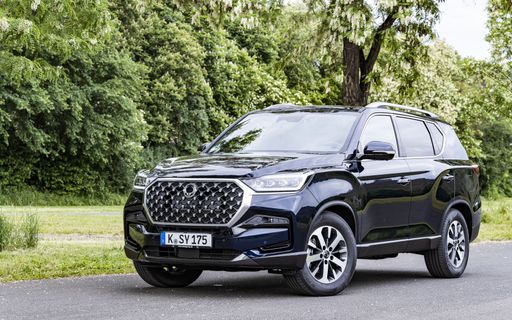 @ Ssangyong
@ Ssangyong
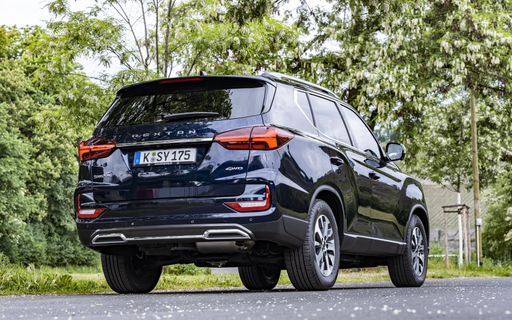 @ Ssangyong
@ Ssangyong
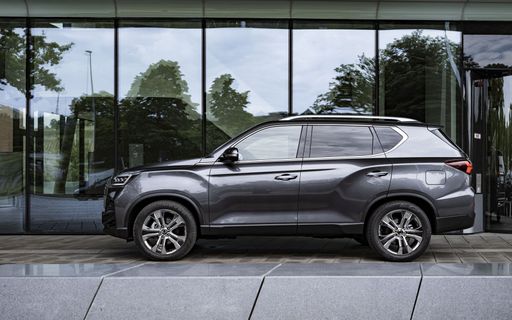 @ Ssangyong
@ Ssangyong
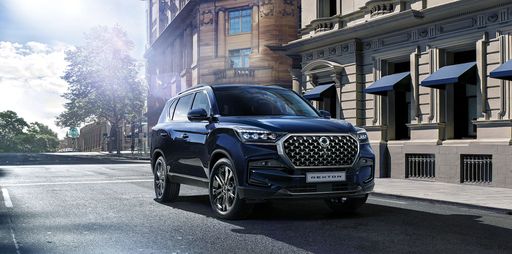 @ Ssangyong
@ Ssangyong
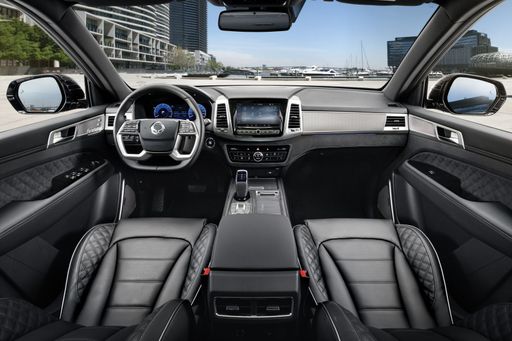 @ Ssangyong
@ Ssangyong

|

|
|
|
|
Costs and Consumption |
|
|---|---|
|
Price
23100 - 41600 £
|
Price
41100 - 51300 £
|
|
Consumption L/100km
4.5 - 6.9 L
|
Consumption L/100km
8.20 L
|
|
Consumption kWh/100km
14.6 - 16.8 kWh
|
Consumption kWh/100km
-
|
|
Electric Range
377 - 514 km
|
Electric Range
-
|
|
Battery Capacity
1.3 - 65.4 kWh
|
Battery Capacity
-
|
|
co2
0 - 157 g/km
|
co2
214 - 216 g/km
|
|
Fuel tank capacity
38 - 47 L
|
Fuel tank capacity
70 L
|
Dimensions and Body |
|
|---|---|
|
Body Type
SUV
|
Body Type
Off-Roader
|
|
Seats
5
|
Seats
5 - 7
|
|
Doors
5
|
Doors
5
|
|
Curb weight
1370 - 1773 kg
|
Curb weight
2145 - 2180 kg
|
|
Trunk capacity
466 L
|
Trunk capacity
236 - 784 L
|
|
Length
4350 - 4385 mm
|
Length
4850 mm
|
|
Width
1825 mm
|
Width
1960 mm
|
|
Height
1580 - 1585 mm
|
Height
1825 mm
|
|
Payload
420 - 490 kg
|
Payload
655 - 770 kg
|
Engine and Performance |
|
|---|---|
|
Engine Type
Petrol, Full Hybrid, Electric
|
Engine Type
Diesel
|
|
Transmission
Manuel, Automatic
|
Transmission
Automatic
|
|
Transmission Detail
Schaltgetriebe, Automat. Schaltgetriebe (Doppelkupplung)
|
Transmission Detail
Automatic Gearbox
|
|
Drive Type
Front-Wheel Drive, All-Wheel Drive
|
Drive Type
All-Wheel Drive
|
|
Power HP
100 - 218 HP
|
Power HP
202 HP
|
|
Acceleration 0-100km/h
7.8 - 13.3 s
|
Acceleration 0-100km/h
10.60 s
|
|
Max Speed
162 - 208 km/h
|
Max Speed
184 km/h
|
|
Torque
200 - 265 Nm
|
Torque
441 Nm
|
|
Number of Cylinders
3 - 4
|
Number of Cylinders
4
|
|
Power kW
74 - 160 kW
|
Power kW
148 kW
|
|
Engine capacity
998 - 1598 cm3
|
Engine capacity
2157 cm3
|
General |
|
|---|---|
|
Model Year
2024
|
Model Year
2021 - 2023
|
|
CO2 Efficiency Class
D, C, E, F, A
|
CO2 Efficiency Class
G
|
|
Brand
Hyundai
|
Brand
SsangYong
|
Hyundai Kona
The Hyundai Kona: A Comprehensive Overview
The Hyundai Kona has established itself as a standout in the compact SUV segment, blending innovation with performance and style. As the automotive world moves towards more sustainable and efficient options, the Kona offers a variety of powertrains, from traditional petrol engines to full hybrids and all-electric models.
Powertrain Options and Performance
The Hyundai Kona's powertrain choices cater to a wide range of preferences. For petrol enthusiasts, the Kona offers a 1.0L T-GDI engine, delivering 100 PS, and a more robust 1.6L T-GDI variant with up to 170 PS. Those looking for efficiency without sacrificing power can consider the full hybrid model, offering 129 PS and an impressive consumption of 4.5 L/100km.
For a greener option, the all-electric Kona provides a compelling case. With battery capacities of up to 65.4 kWh, the electric Kona offers power outputs of 156 to 218 PS, and efficiencies as low as 14.6 kWh/100km, enabling an electric range of up to 513 km.
Technical Specifications and Innovations
Built on a robust platform, the Kona delivers versatility and reliability. With a choice between manual or dual-clutch automatic gearboxes, along with options for front-wheel or all-wheel drive, the Kona ensures a tailored driving experience. The handling is enhanced by the car's lightweight construction, balancing a 1370 to 1773 kg curb weight with dynamic performance.
The Kona's design doesn't compromise cargo space for style; it offers a generous 466 L boot capacity. With a relatively compact body, measuring 4350 to 4385 mm in length, the Kona easily navigates urban environments while still commanding a strong road presence with its 1825 mm width.
Efficiency and Eco-Friendliness
Hyundai is committed to reducing emissions, as evidenced by the Kona's CO2 efficiency ratings, which range from class A for electric models to class D for some higher-performance petrol variants. The focus on reducing environmental impact without sacrificing driving pleasure is notable throughout the Kona range.
Costing and Value
The Hyundai Kona offers commendable value for money. Pricing starts at €26,400 and reaches up to €50,690, depending on the chosen configuration. The monthly running costs range from €956 to €1090, with a cost per kilometre of 38.3 to 43.6 cents, making it a competitive option in its class.
Conclusion: Modern, Efficient, and Versatile
The Hyundai Kona stands as a testament to Hyundai's commitment to innovation, efficiency, and practicality. Whether you are inclined towards a traditional combustion engine, a hybrid for a balance of power and efficiency, or a full electric model for maximum eco-friendliness, the Kona provides a tailored solution for each unique driver preference.
SsangYong Rexton
The SsangYong Rexton: Rugged Elegance on Wheels
The SsangYong Rexton is a versatile SUV that combines robust off-road capabilities with luxurious touches, making it a compelling choice for those who demand both adventure and comfort. Let's dive into the technical nuances and innovations that set this vehicle apart in the competitive SUV segment.
Powertrain Excellence
Under the hood, the SsangYong Rexton embodies power and efficiency with its diesel engine. The e-XDI 220 engine delivers an impressive 202 PS, equating to 148 kW, and generates a torque of 441 Nm. This power is distributed through a sophisticated automatic transmission system, ensuring smooth gear changes and an ideal blend of performance and economy. With an all-wheel-drive system, drivers can confidently tackle diverse terrains, making this SUV a capable partner on any journey.
Impressive Fuel Efficiency and Range
Despite its robust performance, the Rexton is mindful of fuel consumption, boasting a fuel economy of 8.2 L/100km. This efficiency is complemented by a sizeable 70-litre fuel tank, providing an extensive driving range, whether you're navigating urban landscapes or venturing off the beaten path.
Design and Practicality
With dimensions of 4850 mm in length, 1960 mm in width, and 1825 mm in height, the Rexton has a commanding presence. Inside, it offers flexible seating arrangements for up to 7 passengers. The boot space, ranging from 236 to 784 litres, ensures you have ample room for all your gear, making it an ideal companion for family trips or outdoor adventures.
Safety and Technology
Safety is paramount in the SsangYong Rexton. The vehicle is equipped with a suite of advanced safety features, although specifics aren't detailed here. Additionally, modern technological integrations in the Rexton enhance the driving experience, making each journey as enjoyable as it is secure.
Cost-Effectiveness
With monthly running costs ranging between €1075 and €1196 and a cost per kilometre of 86 to 95.7 cents, the Rexton offers a balance of power and efficiency without breaking the bank. The vehicle's price range of €47,990 to €59,890 reflects its premium build and the luxuries it affords its owners.
Environmental Considerations
Though the Rexton impresses with its suite of features, it's worth noting its CO2 emissions, classified in the G efficiency class. With emissions between 214 and 216 g/km, potential buyers might consider how the Rexton's performance aligns with their environmental priorities.
Conclusion: A Commanding SUV Choice
The SsangYong Rexton encapsulates the essence of a modern SUV with its blend of rugged capability, luxury, and intelligent design. Whether you're an urban commuter or an off-road enthusiast, the Rexton promises a driving experience that stands out in both style and substance.
The prices and data displayed are estimates based on German list prices and may vary by country. This information is not legally binding.
